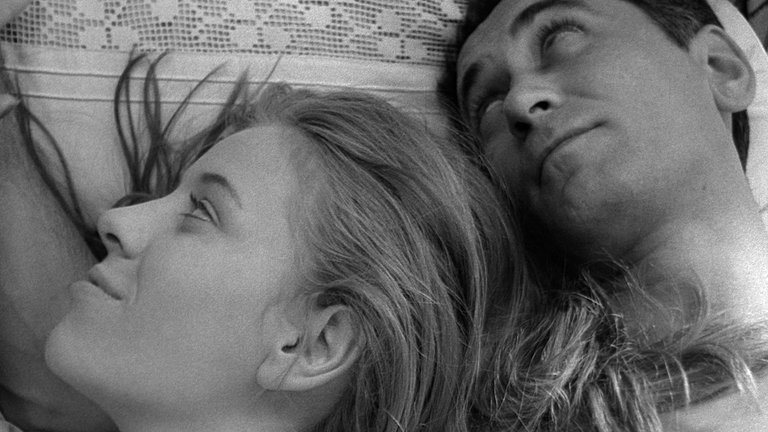Film Review: Love Affair, or the Case of the Missing Switchboard Operator (Ljubavni slučaj ili tragedija službenice PTT, 1967)

The Sexual Revolution, when viewed through a political lens, has historically been tethered to Left-wing ideologies in the West, framed as a countercultural revolt against conservative norms. Baby Boomers weaponised hedonism as a rejection of their parents’ right-wing traditionalism, conflating sexual liberation with progressive politics. In Communist states, however, such associations were fraught with contradiction. Yugoslavia’s Dušan Makavejev attempted to bridge this gap, positing sexual freedom as a natural extension of Marxist principles—a bold gambit that culminated in his 1971 film WR: Mysteries of the Organism being banned, cementing his reputation as a dissident. Yet four years earlier, his Love Affair, or The Case of the Missing Switchboard Operator (1967) dealt with similar themes with surprising impunity at home, even as it ruffled feathers and led to censorship abroad. A cornerstone of the Yugoslav Black Wave, the film remains a provocative artefact of its era, blending eroticism with ideological critique in a manner that challenges both Eastern and Western sensibilities.
At its core, the film follows Izabela (Eva Ras), a young ethnic Hungarian switchboard operator in Belgrade whose inheritance of her mother’s flat grants her unprecedented autonomy. Liberated from familial oversight, she pursues casual liaisons with the encouragement of her colleague Ruža (Ružica Sokić), a co-conspirator in hedonism. Her affair with Ahmed (Slobodan Aligrudić), a self-identified “Turk” working as a rat exterminator, oscillates between passion and possessiveness. When Ahmed departs for long business trip, Izabela’s loneliness leads her into the arms of Mića (Miodrag Andrić), a philandering postman whose advances result in pregnancy. The ensuing tragedy—Ahmed’s drunken, accidental killing of Izabela—serves as a grim metaphor for the collision of tradition and modernity. Makavejev frames their relationship as a microcosm of Yugoslavia’s ethnic and ideological tensions, with Ahmed’s Muslim identity and Izabela’s Hungarian roots reflecting the country’s fractured multiculturalism.
Makavejev’s experimental approach elevates the straightforward narrative into a subversive collage. Documentary interludes feature experts like Dr. Aleksandar Kostić, a pioneer of Yugoslav sexology, whose clinical dissection of human relationships is juxtaposed with grim footage of Izabela’s corpse being retrieved from a sewer. These segments, intercut with archival material—Soviet churches repurposed as warehouses, silent-era erotic tableaux—create a disorienting dialogue between individual desire and collective ideology. The director’s use of East German and Yugoslav patriotic anthems as ironic counterpoints to the protagonists’ intimate turmoil underscores the state’s indifference to personal tragedy. This Brechtian distancing effect invites viewers to question whether sexual liberation can coexist with Marxist collectivism, or if it merely exposes the hypocrisy of state-sanctioned morality.
For Yugoslav audiences, the film’s political subtext was arguably eclipsed by its unprecedented explicitness. Eva Ras, then a rising star, spends much of the film nude—a radical departure from the coy eroticism of earlier Yugoslav cinema. Her unapologetic portrayal of Izabela as a “modern girl” (Ahmed’s term) embodies the New Woman: emancipated, sexually assertive, and unshackled from bourgeois conventions. The iconic image of Ras sprawled naked on a bed, a black cat languidly draped across her, became a cultural touchstone, symbolising both the promise and peril of liberation. While previous actresses had flirted with sex-symbol status, Ras achieved it through unvarnished authenticity, her performance blurring the line between actor and subject.
Yet the film’s avant-garde flourishes—grainy black-and-white cinematography, abrupt cuts to a titles featuring Dušan Radović’s rat-themed poem—risk alienating casual viewers. The allegory of rats, while thematically pertinent to Ahmed’s profession and Yugoslavia’s bureaucratic rot, feels heavy-handed. Similarly, the ethnic dynamics between Izabela (Hungarian), Ahmed (Muslim), and Mića (Serb) may elude those unfamiliar with Yugoslavia’s complex identity politics. Nevertheless, the film’s brevity (a lean 70 minutes) and audacious pacing ensure it never overstays its welcome. Its semi-cult status is well-earned, offering a tantalising glimpse into a moment when Yugoslav cinema dared to interrogate the limits of freedom under socialism.
RATING: 7/10 (+++)
Blog in Croatian https://draxblog.com
Blog in English https://draxreview.wordpress.com/
InLeo blog https://inleo.io/@drax.leo
Hiveonboard: https://hiveonboard.com?ref=drax
InLeo: https://inleo.io/signup?referral=drax.leo
Rising Star game: https://www.risingstargame.com?referrer=drax
1Inch: https://1inch.exchange/#/r/0x83823d8CCB74F828148258BB4457642124b1328e
BTC donations: 1EWxiMiP6iiG9rger3NuUSd6HByaxQWafG
ETH donations: 0xB305F144323b99e6f8b1d66f5D7DE78B498C32A7
BCH donations: qpvxw0jax79lhmvlgcldkzpqanf03r9cjv8y6gtmk9